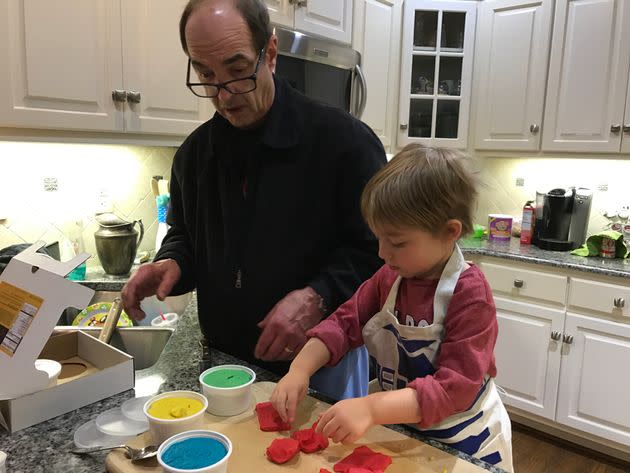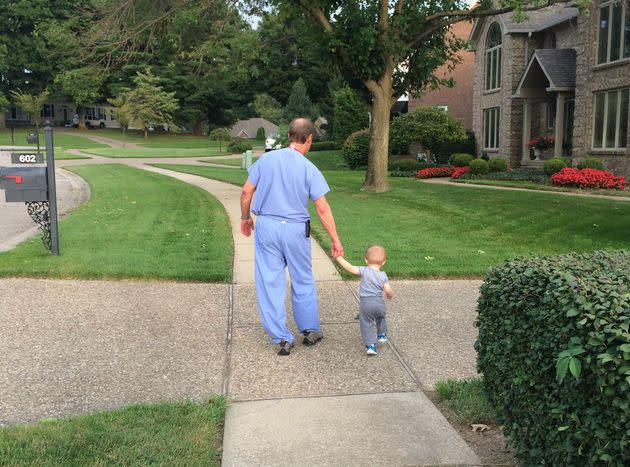A Year After My Dad Died, 1 Thing He Did For My Son Lives On
“Do you still miss Papa?” my 10-year-old asked out of nowhere.
Of course I did. My dad passed away unexpectedly from a heart attack a year and a half ago, and I thought about him every day. My instinct to call and share a funny parenting story or ask “The Grill Master” how I should prepare our chicken dinners remained. It was only after I started planning our conversation in my head that I remembered why I couldn’t call.
Not wanting to upset my son with a long and involved answer, I opted for the simple truth: I missed Papa every day. Shifting the mood, I asked if he remembered all we did together — since 18 months in kid time can feel like 18 years. I wasn’t sure what stuck with him.
“I do,” my son said, “I remember Papa said, ‘yes.’”

Surprised by this new piece of info, I scrambled to grasp what he meant. My dad didn’t fit the definition of a “yes-man.” He wasn’t a pushover to requests like roller skating in the house or using couches as trampolines. (I should know.) But memories of Papa’s yeses to games of hide and seek, flying kites, or watching cartoons overwhelmed my brain. I couldn’t begin to count all the hours my dad agreed to spend time with his grandson — on kid terms. And with this realization came the happy tears. My son was right — Papa did say yes.
Laurel Sims-Stewart, a licensed clinical therapist who works with children and adults, told HuffPost that saying yes to a child’s request for playtime, a favorite meal or an outing in the park is a great way to foster connection and build a solid relationship.
“Doing this helps our kids feel seen, and that their needs and wants matter,” Sims-Stewart said.
Meeting your child’s requests (as long as they’re safe, healthy and appropriate) boosts your kid’s sense of belonging and self-worth. And it’s in this area grandparents hold a particular influence.
Recent research has found that grandparent involvement during childhood is positively linked to emotional development, cognitive functioning and social adjustment in early adulthood.
But that certainly wasn’t the motivation behind our weekly sleepovers at my parents’ home. My son just loved it.
My dad’s ability to say yes to my kiddo’s entreaties for playtime or slow walks around the neighborhood was a big reason for this. During “yes time,” Papa’s puns flew almost as fast as the paper airplanes they folded, too much sugar was consumed, and the giggling from both was nonstop. My dad’s yeses came easy — easier than mine.
“Grandparents have no charge to correct and teach all things. This is a weight they no longer bear,” said Tiffany Keith, a licensed marriage and family therapist associate. Since grandma and grandpa are relieved of the heavy-duty responsibilities of child-raising, like managing tantrums or dealing with complicated schedules, they have the freedom to say yes more.
Sims-Stewart told HuffPost that the grandparent/grandchild dynamic is a singular one because grandparents can focus more on fun and building a loving, secure connection. “There’s often less practical responsibility and more room for flexibility with rules and expectations — for example, maybe a kiddo gets to stay up a little bit later when they go to Nana’s house as a special treat,” Sims-Stewart said.

“Papa gave me a donut before and after dinner,” was a familiar shout from my son after he’d spent an evening with my dad. I ran a “one dessert household,” but my son’s excitement (and my dad’s sly grin), made this sugary indulgence easy to overlook.
Papa’s yeses (aside from the donuts) aligned with the parenting values my husband and I set. However, my mom brain still wondered if all the positives would eventually add up to one big negative. Could all those yesses make my son entitled or have unrealistic life expectations? Would he have a tough time accepting a no? Not necessarily.
According to the American College of Pediatrics, children hear ‘no’ so often that saying yes instead (or reframing the ‘no’ into a positive, like “use soft voices inside” instead of “stop yelling”) help a child learn consequences and feel valued. Sims-Stewart said that focusing on front-loading yeses in our relationships with children (as long as they’re appropriate) can help our kids be better equipped emotionally to accept a no when it’s really necessary.
My dad still maintained loving boundaries when it came to my son. Papa knew letting my kid have a couple of donuts was fun, but letting him eat a full bag would equal an epic sugar crash — and an annoyed daughter. The focus at Papa’s house was about being playful and flexible when appropriate.
“Boundaries and rules, even if they’re a little more lax at a grandparent’s home, help kids to feel a sense of safety and stability,” Sims-Stewart said.
Rules with the grandparents can be different from those enforced at home — and still be healthy. Sims-Stewart said being more flexible in the grandparent expectations can feel special for children, just like it does when adults take a day off work or sleep in on a vacation.
“We all love having time spent ‘outside’ our everyday rules, and this flexibility helps grandkids look forward to time with grandparents and makes that time feel rewarding,” said Sims-Stewart.
The positive effects may spill over to the rest of the family, too. Keith told HuffPost that setting different expectations with grandparents can balance possible over-parenting and allow grandparents to see the parent-child relationshipfrom an outside perspective. “Providing this safe space for grandkids can relieve pressure for parents and kids,” Keith said.
“Which ‘yes’ do you remember most?” I asked my son.
I watched his eyes brighten as he listed not one memory, but many. He went through all the yeses he could remember: The evening walks. Games of driveway ball. Playing school in the basement. Preparing meals together. His smile grew with each recollection, and I could see how every one of Papa’s yeses built up my son’s confidence and gave him a sense of value that transcended parent and peer approval. And now it’s standing the test of time.

